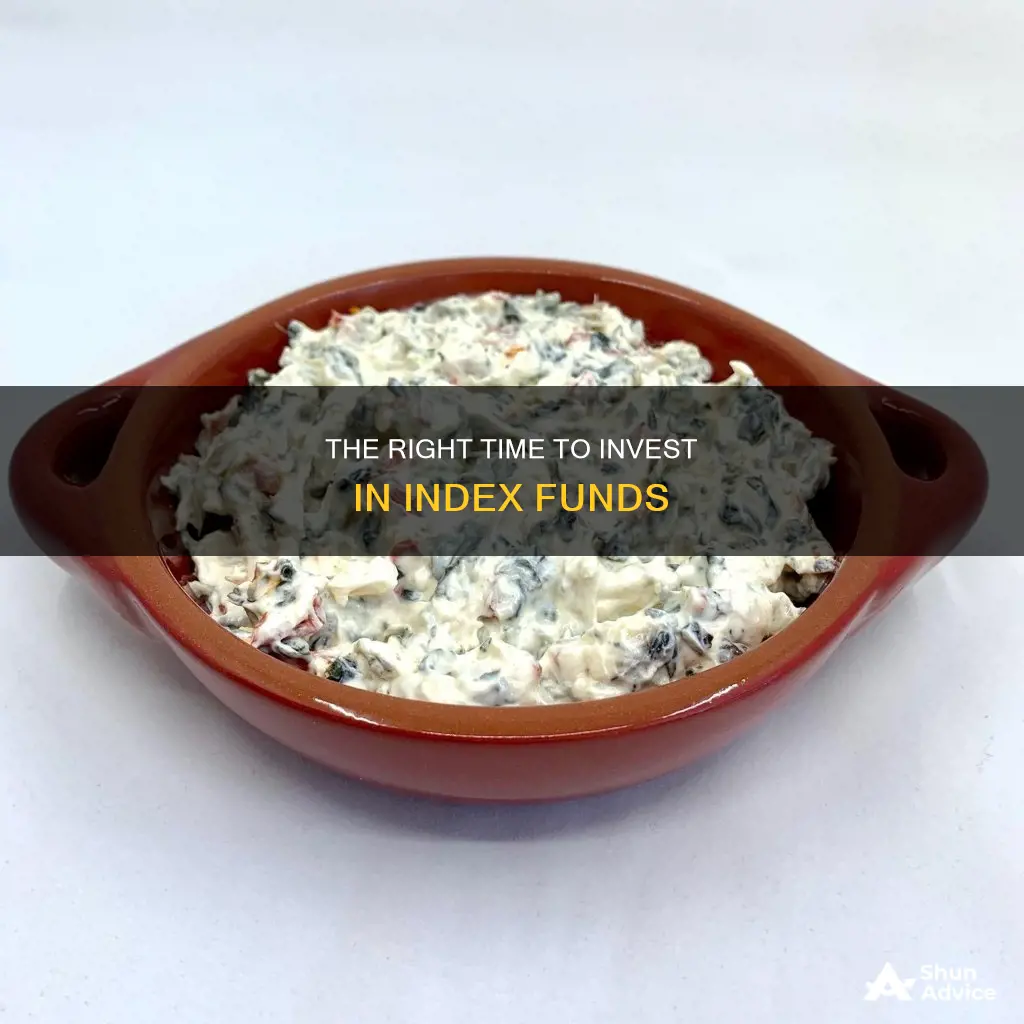
Index funds are a popular investment choice, especially for beginners. They are a type of mutual or exchange-traded fund (ETF) that tracks the performance of a market index, such as the S&P 500, by holding the same stocks or bonds or a representative sample of them. Index funds are passive investments that aim to replicate the performance of a specific market index without the need for active management. This means they are often cheaper than other funds, with lower fees and expense ratios.
Index funds are a good choice for investors seeking low-cost, diversified, and passive investments. They are ideal for long-term investing, such as retirement accounts, and offer advantages like lower risk through diversification and solid long-term returns. However, they are subject to market swings and lack the flexibility of active management.
So, when is the best time to invest in index funds? For most long-term investors, any time can be a good time to invest in index funds. However, certain market conditions can give index funds an advantage over actively managed funds. During a strong bull market, when stock prices are rising across all sectors, active funds may lose their advantage as strategic buying and selling is less effective. Recessions can also make bond index funds a smarter choice, as bond fund managers with active management strategies often struggle to navigate the market.
Overall, the best time to invest in index funds depends on your financial goals, risk tolerance, and the broader market conditions. Consulting a financial advisor can help you determine if index funds are a suitable investment choice for your portfolio.
| Characteristics | Values |
|---|---|
| Best time to invest | Any time, but especially during a strong bull market |
| Investment type | Mutual funds or exchange-traded funds (ETFs) |
| Investment strategy | Passive |
| Investment goal | Long-term |
| Investment performance | Historically, index funds have outperformed actively managed funds |
| Investment risk | Low |
| Investment cost | Low fees |
What You'll Learn

Index funds vs. individual stocks
Index funds are a type of investment fund that tracks the performance of a specific market index, such as the S&P 500. They are designed to be well-diversified, low-cost, and low-risk investment options. By investing in an index fund, individuals gain exposure to a wide range of securities, reducing the risk associated with investing in individual stocks.
Investing in index funds offers several advantages over individual stocks. Firstly, index funds provide immediate diversification. A single investment in an index fund based on the S&P 500, for example, provides ownership in hundreds of companies across various sectors and industries. This diversification leads to lower risk compared to owning a few individual stocks, as it reduces the impact of any single stock's performance on the overall investment.
Additionally, index funds have lower fees than actively managed funds. They are passively managed, meaning they aim to replicate the performance of the underlying index rather than actively selecting stocks. As a result, index funds have lower management fees and transaction costs, which can significantly enhance returns over time.
Index funds also offer tax advantages. They generate less taxable income due to lower turnover of securities, and they can strategically choose which lots to sell when realising capital gains, minimising the tax burden passed on to investors.
However, one drawback of index funds is that they rise and fall with the market. If the market experiences a correction, an index fund tracking that market will also drop. In contrast, an actively managed fund may be able to buffer against such downturns by adjusting its positions.
Additionally, the diversification of index funds can limit their upside potential. The broad basket of stocks may include some underperforming companies, dragging down the overall return compared to a more selective portfolio.
For individuals who have the time, knowledge, and interest in selecting individual stocks, this approach can offer the potential for higher returns. Picking winning stocks requires extensive research and a deep understanding of the market and specific companies. It also allows investors to have more control over their investments, choosing companies that align with their values or areas of interest.
In conclusion, index funds provide a well-diversified, low-cost, and low-risk investment option, making them suitable for individuals who want a more passive approach to investing. On the other hand, investing in individual stocks can offer the potential for higher returns but requires more effort, carries greater risk, and may result in higher fees.
Vanguard Funds: Best Investment Options for Your Portfolio
You may want to see also

Index funds vs. actively managed funds
Index funds are passively managed, meaning they are designed to keep pace with market returns by trying to mirror certain market segments. They are a type of investment that attempts to track the overall success of a particular market or index, like the S&P 500 or Dow Jones Industrial Average. They do this by offering small pieces of most or all of the stocks in an index, pooled together. They make diversification much easier for the average investor, and the passive management style allows the manager to charge lower investment advisory fees.
Actively managed funds, on the other hand, try to beat market returns with investments hand-picked by professional money managers. They are more expensive to run than index funds due to the higher fees involved in paying for professional money managers.
Index funds are often seen as less volatile investments because they are more diversified than an investment in individual stocks. They are also associated with lower fees and expense ratios. However, they give investors less control than other types of investments and are subject to the same risks as the securities that make up the index.
Actively managed funds, meanwhile, give investors the chance to beat the market and may offer better protection in a market correction. However, few managers have been able to consistently outperform the market year after year. Actively managed funds are also associated with higher taxable capital gains as managers trade more often.
In summary, index funds are a good choice for investors who want a low-cost, diversified investment that requires little research or management. Actively managed funds may be preferable for investors who want the potential for higher returns and are willing to pay higher fees for professional management.
Hedge Fund Investment Strategies: Where and How They Invest
You may want to see also

Index funds for beginners
Index funds are a great way to get started with investing. They are a simple, cost-effective way to hold a broad range of stocks or bonds that mimic a specific benchmark index, meaning they are diversified.
Index funds are a type of mutual or exchange-traded fund (ETF) that tracks the performance of a market index, such as the S&P 500, by holding the same stocks or bonds, or a representative sample of them. They are a passive investment strategy, meaning they don't require active management.
Index funds don't try to beat the market or earn higher returns. Instead, they aim to be the market by buying stocks of every firm listed on a market index. This makes them a low-cost investment option.
Index funds are less expensive than actively managed funds, and they typically carry less risk than individual stocks. They are also a great investment for building wealth over the long term, which is why they are popular with retirement investors.
How to invest in index funds
- Have a goal: Know what you want your money to do for you. If you're looking to let your money grow slowly over time, index funds may be a great investment for your portfolio.
- Research index funds: Consider factors such as company size and capitalization, geography, business sector or industry, asset type, and market opportunities.
- Pick your index funds: Choose an index fund that corresponds to your goals, keeping in mind that lower costs are one of the biggest selling points of index funds.
- Decide where to buy your index funds: You can purchase an index fund directly from a mutual fund company or a brokerage.
- Keep an eye on your index funds: Index funds are passive investments, but that doesn't mean you should completely ignore them. Make sure your index fund is doing its job by mirroring the performance of the underlying index.
Yes, index funds can be an excellent option for beginners. They are a simple, cost-effective way to invest in a diversified portfolio, and they often outperform actively managed funds.
For most long-term investors, any time can be a good time to invest in index funds. Index funds can be a smart choice during a strong bull market, when stock prices are rising across all sectors. Recessions can also be a good time to invest in bond index funds.
Remember, there is no foolproof method for predicting what types of mutual funds will perform better than others, and past performance does not guarantee future results. It's important to do your own research and consider seeking professional advice before investing.
Key Considerations for Investing in Algorithmic Trading Funds
You may want to see also

Index funds for long-term investing
Index funds are a great investment for building wealth over the long term. They are a group of stocks that mirror the performance of an existing stock market index, such as the S&P 500. An index fund will be made up of the same investments that make up the index it tracks, allowing for passive management and less volatility compared to individual stocks.
Index funds are a popular choice for investors seeking low-cost, diversified, and passive investments that tend to outperform many higher-fee, actively traded funds. They are ideal for long-term investing, such as retirement accounts. Here are some reasons why:
- Lower fees: Index funds have lower expense ratios because they are passively managed. Actively managed funds, on the other hand, have large staffs and conduct more trades, driving up costs.
- Market representation: Index funds aim to mirror the performance of a specific index, offering broad market exposure. This is ideal for investors seeking a diversified investment that tracks overall market trends.
- Transparency: The holdings of an index fund are well-known and easily accessible on investing platforms, making it easy to understand what you are investing in.
- Historical performance: Over the long term, many index funds have outperformed actively managed funds, especially after accounting for fees and expenses.
- Tax efficiency: Lower turnover rates in index funds result in fewer capital gains distributions, making them more tax-efficient than actively managed funds.
- Lower risk: Index funds are generally safer than individual stocks due to their diversification. They track a specific market index, containing a broad range of stocks across various sectors.
For most long-term investors, any time can be a good time to invest in index funds. However, certain market conditions can give index funds an advantage. During a strong bull market, when stock prices are rising across all sectors, active funds may lose their advantage as strategic buying and selling is less effective. Recessions can also make bond index funds more attractive, as bond fund managers with active management strategies often struggle to navigate the market.
It's important to remember that there is no foolproof method for predicting the performance of mutual funds, and even index funds can be subject to market swings. Consulting a financial advisor can help you make informed decisions based on your financial situation, goals, and risk tolerance.
Vanguard Mutual Funds: Best Retirement Investment Options
You may want to see also

Index funds for retirement
Index funds are a great investment for building wealth over the long term, which is why they're popular with retirement investors. They are a low-cost, easy way to build wealth, and they often perform better than actively managed funds over time.
Index funds are a type of mutual or exchange-traded fund (ETF) that tracks the performance of a market index, such as the S&P 500, by holding the same stocks or bonds or a representative sample of them. They are defined as investments that mirror the performance of benchmarks like the S&P 500 by mimicking their makeup.
Index funds are ideal for retirement because they are a passive, long-term investment strategy with low fees. They are also well-suited to retirement investing because they offer broad market exposure and diversification across various sectors and asset classes.
- Choose an index like the S&P 500, Dow Jones Industrial Average, Nasdaq Composite, Russell 2000, or MSCI EAFE.
- Select an index fund with the lowest costs and closest index tracking.
- Consider investing in a broad index fund, such as the S&P 500, or a more focused index fund that invests in specific sectors or trends.
- Look for index funds with low expense ratios, which are the annual management fees collected by index fund managers.
- Decide whether to invest in a mutual fund or an exchange-traded fund (ETF). Mutual funds are bought directly from asset management companies, while shares in ETFs are purchased and sold through stock exchanges.
- Choose a fund with a low minimum investment amount, so you can start investing with a small amount of money.
- Consider investing in a fund that tracks the performance of the entire U.S. stock market, such as the S&P 500, or a specific segment of it, such as a particular sector, industry, or country.
- Be patient and stick with your investment strategy, even during market downturns.
- Vanguard S&P 500 ETF (VOO)
- Vanguard Total Stock Market (VTI)
- Vanguard Total International Stock Market (VXUS)
- Vanguard Total Bond (BND)
- Fidelity ZERO Large Cap Index Fund (FNILX)
- Vanguard Growth ETF (VUG)
- SPDR S&P Dividend ETF (SDY)
- Vanguard Real Estate ETF (VNQ)
- Vanguard Russell 2000 ETF (VTWO)
U.S.A.A. Mutual Funds: Where to Invest Wisely
You may want to see also
Frequently asked questions
Index funds are a type of mutual or exchange-traded fund (ETF) that tracks the performance of a market index, such as the S&P 500, by holding the same stocks or bonds or a representative sample of them.
Index funds are a low-cost, easy way to build wealth. They are less expensive than actively managed funds and typically carry less risk than individual stocks. They are also more tax-efficient and are a great investment for building wealth over the long term.
Index funds are passively managed and therefore lack the flexibility to pivot away when the market shifts. They also automatically include all the securities in an index, which means they may invest in overvalued or weak companies.
You can invest in index funds by opening and funding a brokerage account, an individual retirement account (IRA), or a Roth IRA. You can then buy the fund in the account.
Whether the market is down or up, as long as you're investing for the long term in a well-diversified portfolio, it's as good a time as any. If the market is down, it's essentially on sale, and you may be able to pick up an index fund for less money.







